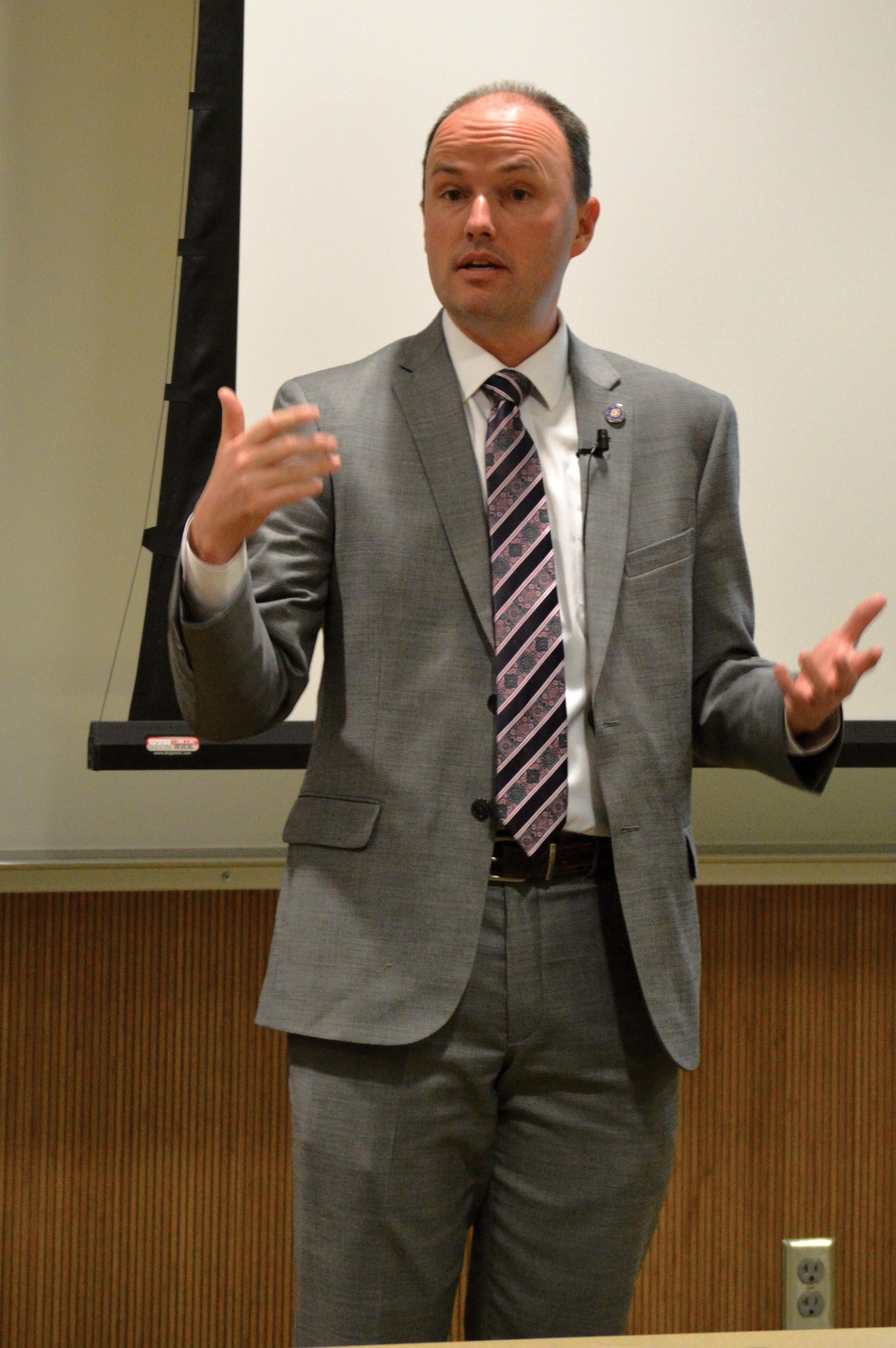Spencer Cox makes stop at USU on the campaign trail
Lt. Gov. and gubernatorial candidate Spencer Cox spoke at Utah State University on Thursday about why he’s running for governor and the issues his administration will focus on, principally infrastructure growth and education.
“Politics is fundamentally broken in our country,” Cox said. “It’s become a competition to tear other people down.”
Cox said he is running to make a difference in a continually bitter and divisive political process.
“The system only works if everyone gets involved,” he said. “That’s the grand experiment and it’s not working as well now. When that happens, only the extreme elements of the party show up.”
Cox, who has served as Lt. Gov. of Utah for almost seven years, said he almost told Gov. Gary Herbert “no” when asked if he would take the position in 2013.
“I told my wife I was going to say no, and she said maybe we should rethink that,” Cox said. “She said one of the biggest problems we have today is that people doing these jobs really want them. I think we might need more people who don’t want these jobs.”
According to Cox, studies done by political scientists demonstrate how moderate candidates tend to accomplish their initiatives in congress. Unfortunately, he added, the country is so polarized that studies show there are only seven or eight true moderates left.
“The country is probably the most divided it’s been since the Civil War,” Cox said.
Cox believes the problem stems from the fact that the nation is lonelier than at almost any other time in history.
“We have fewer true friends and, again the data is very clear on this, fewer people we can share our hopes and dreams with,” Cox said.
Despite these issues, Cox said Utah is still different from the rest of the nation.
“We still care about each other, we lead the nation in volunteerism and charitable giving and there’s not a close second,” he said.
Cox said Utah has these values because they hold elected officials to a higher standard, adding that, historically, negative campaigning has not worked in Utah like it has in other places.
On the issues, he said the state does have a few challenges. Concerning the challenges facing growth, Cox said he has a simple formula that “has not failed me yet.”
“Where infrastructure proceeds growth and density, the quality of life stays high,” he said. “When the opposite is true, the quality of life goes down.”
Cox said the role of the state is not to tell communities where to build but to help with infrastructure projects like water and transportation. However, he said none of that matters if the state can’t get education right.
“We have a teacher shortage in this state,” Cox said. “Around 48 percent of our teachers leave the profession in the first five years. I can’t think of any other employment group where the numbers are that high.”
There are two problems the state needs to address with education, Cox said. The first one is compensation. “My own brother was a teacher and realized he could not raise four kids on a teacher’s salary here,” he said.
To solve this problem, Cox said the state needs to get teacher’s salaries to $60,000 over the next few years. He said this is doable if they can be intentional about it and focus on the issue.
The second problem that needs to be addressed for Utah teachers is that the joy has been taken out of teaching, Cox said. Despite having the best economy in the country and having economic diversity in almost every job sector, the exact opposite has been done with education, he said.
Unlike other sectors where regulations have been lowered, Cox said we are over-regulating teachers. “High stakes testing, school grading — all these things being done to hold teachers accountable have turned them into robots.”
The solution, according to Cox, is to get rid of regulation and allow teachers to thrive and focus on individualized learning with smaller classrooms.
Shaylee Reynolds, the Huntsman Scholar Program assistant, said she loved what Cox had to say about education.
“My husband and I both work in education, so what he had to say really resonated with me,” she said.
Another event attendee, USU senior Dylan Passmore, said for Utah to continue to be successful, a governor like Spencer Cox is needed.
“Along with education, I hope Cox helps the economy keep up with the speed that it’s had in the past,” Passmore said.
Jeannie Johnson, an associate professor in the Department of Political Science , said the most impressive thing about Cox is his connection to two vital segments of Utah.
“He comes from a rural upbringing,” Johnson said. “I focus on the high-tech emerging technology sector, and I have been wildly impressed with the Lt. Gov.’s ability to connect those two communities.”
According to the Salt Lake Tribune, the latest polls for the gubernatorial race show Cox leading over other Republican candidates.
tayorcripe@gmail.com
@cripe_taylor

